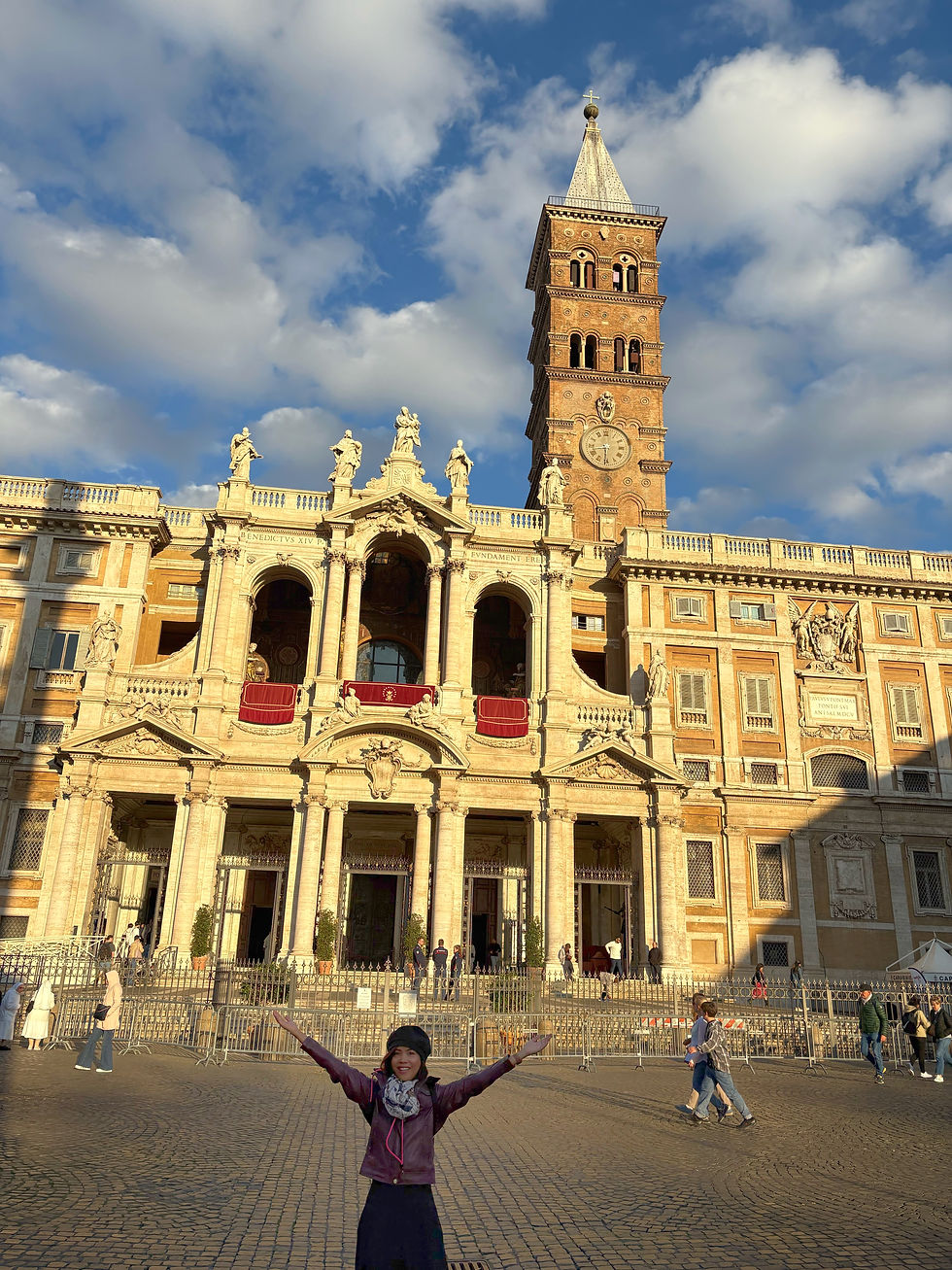Seeking the Kingdom: Why My Faith Remains Rooted in the Catholic Church
- Carmela Kaiser
- Aug 18, 2025
- 4 min read
In conversations about faith, one of the recurring themes I encounter is how Christians view Mary, the saints, and the Catholic Church itself. Some of my fellow Christians—often from Protestant or evangelical traditions—assume Catholics put Mary or the saints “above” Jesus. But the truth is the opposite: my faith is in Jesus Christ alone. Mary’s role—and that of the saints—is to reflect Him, guide us toward Him, and intercede for us in prayer, always pointing to Christ, never away from Him.
The Roots of Misunderstanding
Much of the confusion is historical. In England during the 16th and 17th centuries, the Puritan movement rose out of dissatisfaction with the Church of England, which many felt had not reformed itself enough after breaking from Rome. They emphasized strict biblical preaching and personal holiness, while rejecting practices they considered “too Catholic.”
One notable gathering place was Cripplegate in London, where preachers like John Owen, Richard Baxter, and Thomas Watson taught Scripture-heavy sermons and fostered theological debate. Centuries later, students of Charles Spurgeon revived those exercises, and today websites like The Cripplegate carry on that Puritan-Reformed voice. Their convictions are sincere, but their heritage is rooted in a rejection of Catholic sacramental theology—explaining why Catholic devotion to Mary, the saints, or the sacraments is often misrepresented.
Did Jesus Distance Himself from Mary?
One common objection is that Catholics “exalt” Mary when Jesus Himself seemed to distance Himself, calling her “Woman” instead of “Mother.”
To modern ears, this sounds dismissive. But in first-century Jewish culture, “Woman” was a title of honor—like “Ma’am” or “Lady.” And John’s Gospel records Jesus using it at two pivotal moments:
At Cana (John 2:4): He reveals her role as the New Eve. Eve’s disobedience led to the Fall; Mary’s obedience sets redemption in motion.
At the Cross (John 19:26): He entrusts Mary to John, and John to Mary, making her the spiritual mother of all believers.
Far from disrespect, Christ was elevating her to a prophetic role in salvation history.
The Witness of the Early Church Fathers
My own rediscovery of the early Church Fathers opened my eyes. These bishops and martyrs lived centuries before denominational divides, and they consistently affirmed a faith that was both biblical and Catholic.
St. Irenaeus (2nd century): “The knot of Eve’s disobedience was loosed by the obedience of Mary…” (Against Heresies 3.22.4)
St. Athanasius (4th century): “Beyond these [Scriptures], let us look at the very tradition… which the Lord gave, the Apostles preached, and the Fathers preserved.” (Letters to Serapion 1.28)
St. Augustine (4th century): “I would not believe the Gospel unless moved by the authority of the Catholic Church.” (Against the Epistle of Manichaeus 5.6)
Some dismiss Irenaeus because he wasn’t an Apostle. But by that logic, should we also doubt Mark or Luke—two Gospel writers who weren’t Apostles either? We accept their writings because the Church, guided by the Holy Spirit, discerned them as inspired.
Likewise, Irenaeus—taught by St. Polycarp, a disciple of St. John—stands as a trustworthy witness to apostolic faith.
When Words Are Twisted
If even a single word like “Woman” can be twisted to imply dishonor, how many other misinterpretations exist among the 40,000+ Christian denominations, each reshaping Scripture to fit its own narrative? This isn’t about “winning” arguments but about clarity. My intent is not to attack but to untangle misconceptions that cause division within the Body of Christ.
What puzzles me is why the Catholic Church is so often singled out. Charges of “pagan practices” or “man-made traditions” are hurled at her, while the real challenges to Christianity—such as the rapid spread of secularism and Islamism—go largely unaddressed. Division weakens us while others advance unopposed.
My Catholic Upbringing—And Awakening
I understand why many Catholics leave for other Christian groups. Like me, they were often taught the faith academically, without depth or personal encounter. I once attended non-Catholic services, searching for something “more alive.” But in the end, my heart never felt at home outside the Church I was born into.
The problem was not Catholicism itself but my shallow formation. No one had shown me how Scripture, Tradition, and the Church’s teachings form one unified whole. Only later did I discover the richness of the Eucharist, the communion of saints, and the wisdom of the Fathers.
Seeking the Kingdom
Today, I thank God for awakening me. I now seek the Kingdom wholeheartedly, not superficially, diving into Scripture, history, and the Church’s apostolic mission. The Catholic Faith is not a patchwork of “man-made traditions” but the living continuation of the Church Christ founded—still standing because He promised, “The gates of hell shall not prevail against it” (Matt 16:18).
Mary and the saints are not rivals of Christ but companions on the journey, intercessors who pray with us and for us. Just as I ask a friend on earth to pray for me, I ask those in heaven who already behold Him face to face.
A Call to Unity
Christ prayed, “that they may be one” (John 17:21). He foresaw that our unity—or lack of it—would be the Church’s greatest testimony. Division gives non-believers a reason to dismiss us. Imagine instead if Catholics, Protestants, and Orthodox stood together—defending life, truth, and the persecuted. That unity would shine brighter than any debate.
For myself, I choose to trust the faith handed down by the Fathers, rooted in apostolic succession, rather than the shifting interpretations of modern reformers. The faith of the early centuries was Catholic: whole, universal, and united.
So yes, we can “agree to disagree” on some doctrines. But the bigger picture remains: the world needs Christ. And our unity in Him is the greatest testimony we can give.





Comments